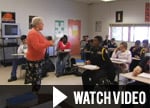Parents → Prekindergarten to High School → High School
Welcome to High School: Grades 9–12
 By the time they get to high school, students are beginning to think about college and careers and what they need to do to be prepared for the next phase of their lives. Although parents are kept informed about student progress, students are expected to take responsibility for their academic performance and advocate for themselves. The transition from parents advocating for their children to students self-advocating is a step toward independence and preparation for the post-high school world.
By the time they get to high school, students are beginning to think about college and careers and what they need to do to be prepared for the next phase of their lives. Although parents are kept informed about student progress, students are expected to take responsibility for their academic performance and advocate for themselves. The transition from parents advocating for their children to students self-advocating is a step toward independence and preparation for the post-high school world.
Your student will have many more academic choices in high school, as well as more extra-curricular activities in which to participate. A student who plays an instrument might have a choice between jazz ensemble, classical quartet, jazz quartet, stage band, and marching band. There are additional sports available. Clubs and other groups offer a wide range of opportunities for students to explore.
Orientation is held for incoming ninth graders and other new students on the Thursday before the start of school. This half-day orientation gives students a chance to tour their school, take a test run on their bus route, and become acquainted with their new classmates and teachers prior to the first day of school.
The structure of a typical high school day is similar to that in middle school. Like middle schools, high schools classes are scheduled based on a seven-period day or block scheduling. Most high schools begin at 7:25 a.m. and dismiss at 2:10 p.m.
Some high school students have the option of going off-campus during the lunch period. To find out if your child's high school has an "open lunch" policy, contact the school office.
Homework is a regular part of high school life. Students should write homework assignments in their planners or assignment books and check on assignment due dates on a regular basis.
Instructional Program
 High schools provide a comprehensive program of studies that includes a variety of rigorous courses to prepare students for college and other postsecondary studies and employment. Students should talk to their parents, teachers, and counselor on a regular basis about the courses needed to fulfill their post-secondary goals.
High schools provide a comprehensive program of studies that includes a variety of rigorous courses to prepare students for college and other postsecondary studies and employment. Students should talk to their parents, teachers, and counselor on a regular basis about the courses needed to fulfill their post-secondary goals.
High school students have the option of participating in a variety of classes and programs, magnet and signature programs, academies, International Baccalaureate programs, career and technology courses, and consortia programs, among others. Check with your child's counselor for additional information on specialized academic programs.
All high school students are encouraged to take rigorous Honors, Advanced Placement (AP), and other advanced classes. Each high school has a process in place that ensures that all students have access to Honors and AP courses. Honors courses are offered in subjects including art, computer science, English, foreign languages, mathematics, music, science, and social studies. Students can earn college credit or advanced standing based on their scores on AP exams. AP courses are offered in art, information technology/computer science, English, foreign languages, mathematics, music, science, and social studies, although course offerings vary somewhat from school to school.
All subjects in high school are taught by semester. A passing final grade in a semester course earns 0.5 credit. A total of 22 credits in required and elective courses is needed to earn a high school diploma. The MCPS High School Course Bulletin, updated every year and available on the MCPS website, provides students and parents with information about course offerings and graduation requirements.
Each final grade earned signifies "points"-A is 4 points, B is 3 points, C is 2 points, D is 1 point, and an E is 0 points. The sum of the final grade points divided by the number of courses determines the cumulative grade point average (GPA). An A or a B in an Honors or advanced class earns an additional point, as does a "C" in an advanced class. These increased points result in a weighted GPA (WGPA).
A transcript is a record of all courses taken in high school, the level of the courses, and the final grade earned in each course. Usually, colleges and employers want to review a student's transcript as part of the college admissions or job application process. Students should check with the school registrar for information on obtaining transcripts.
MCPS offers several programs in conjunction with local colleges and universities that provide students with the opportunity to take college-level courses. In addition, MCPS partners with Montgomery College to offer a variety of programs that serve the academic needs of students. Check with the school counselor to find out what is available for your student.
Additional Information
Test Prep Online
Online Resources for High School StudentsHSA Prep Online is an interactive database of test questions, answers, and explanations that helps students practice independently for the High School Assessments, required by the state for graduation.
College Board SAT Online Prep Program is available free of charge to all MCPS students. This online course allows students to practice and review SAT math, critical reading, and writing practice questions including a review of the SAT essay. Students may download, print, and take a free, official full-length SAT practice test online. A free score and skills report is produced with explanations to all test answers.
Additional Information
Extracurricular Activities, Sports, and Special Events
 High schools offer a very wide variety of extracurricular activities, including clubs, student government, and intramural/interscholastic sports. Extracurricular offerings vary from school to school, so check with your school to find out what is available.
High schools offer a very wide variety of extracurricular activities, including clubs, student government, and intramural/interscholastic sports. Extracurricular offerings vary from school to school, so check with your school to find out what is available.
For students interested in athletics, MCPS high schools have sports teams competing in sixteen sports, in addition to cheerleading and pompons. Some of these teams or squads may begin practice sessions in mid-August. Each high school has an athletic director who supervises and administers the local school athletic school program.
Students who participate on sports teams are required to submit a medical evaluation form, a parent permission form, and a transportation permission form. The medical evaluation form requires students to have a physical examination by a doctor or nurse practitioner. Some schools make arrangements for sports physicals to be conducted at the school; check with the athletic director at your school if you have questions or need assistance arranging for the sports physical.
Students who wish to participate in extracurricular activities or sports must maintain a 2.0 marking period average, with not more than one failing grade in the previous marking period. If these requirements are not met, the student is academically ineligible to participate in extracurricular activities.
Additional Information
College and Career Planning
 School counselors meet with students regularly to guide and support them through academic and career planning. In addition, every high school has a college and career information center that is open year round for students to explore various career possibilities, research colleges and universities, the college application process, testing, financial aid, scholarships, summer programs, jobs, or other college/career-related topics. Every center is staffed by a coordinator who can help students locate information and resources.
School counselors meet with students regularly to guide and support them through academic and career planning. In addition, every high school has a college and career information center that is open year round for students to explore various career possibilities, research colleges and universities, the college application process, testing, financial aid, scholarships, summer programs, jobs, or other college/career-related topics. Every center is staffed by a coordinator who can help students locate information and resources.
College fairs are held every year at various locations throughout the county. These fairs are an opportunity for students and parents to get information and talk with representatives from colleges and universities. Students should check with the college and career center at their school for dates, time, and locations of these events.
The MCPS website has a page dedicated to college and career planning. Information is available on a wide range of topics including career awareness, college options, military careers, entrance exams, and financial aid.
Additional Information
Student Grades and Graduation Credit Report
The Student Grades and Graduation Credit Report provides information about a student’s academic performance and progress toward fulfilling the requirements for a Maryland high school diploma. This report accompanies the first and third marking period report cards for all Grade 9–12 students and contains the following information:
- Courses taken, grades, credits earned, and credits still required
- Academic performance: cumulative Grade Point Average (GPA) and Weighted GPA
- High School Assessment (HSA) status
- Student Service Learning (SSL) status
Alternatives to Traditional High School Setting
The Gateway to College Program at Montgomery College serves at-risk youth, 16 to 20 years old, who have stopped attending a Montgomery County public high school and for whom high school completion is at risk. The program gives students the opportunity to earn a high school diploma while transitioning to a college campus. Students may simultaneously accumulate high school and college credits, earning their high school diploma while progressing toward an associate degree or certificate. For additional information, contact your school counselor, go online, or call 301-610-4045.
High School Plus, a free program available at all high schools, offers instruction to students who failed courses required for graduation, including the High School Assessments. High School Plus allows students to recover lost credit before or after school or during lunch periods. Contact your school counselor for information about what courses are available.
The Online Pathway to Graduation program is a year-long program that enables former MCPS students, no longer enrolled in MCPS and needing three credits or fewer, to meet the academic requirements for a Maryland high school diploma. Participants progress through online courses at their own pace with support from a teacher. The evening class sessions are offered at the Center for Technology Innovation, 4 Choke Cherry Road in Rockville. For more information contact the counseling office at the high school the student last attended or visit online.
Additional Information
- Gateway to College, 301-610-4045
- High School Plus
- Online Pathway to Graduation

